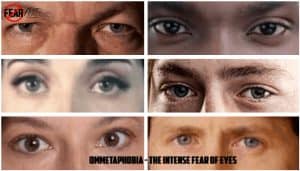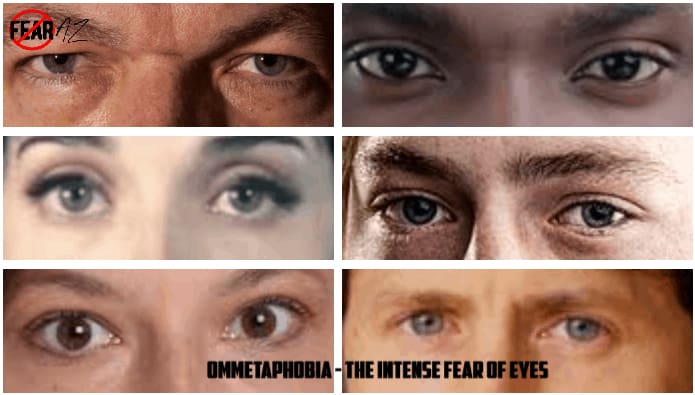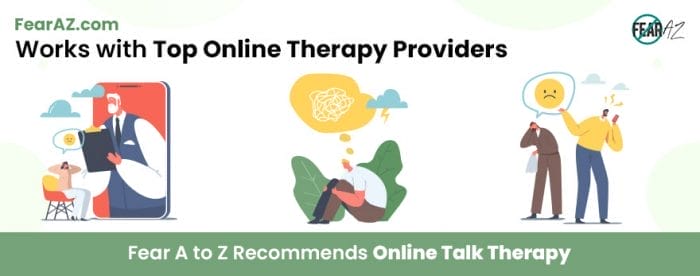Share This Article
Looking Into Ommetaphobia – The Intense Fear of Eyes
Eyes: How do you find them?
Yes, eyes, as in those two glowing beacons on your face which transmit sight to the mind?
Are you terrified to look at them? Does the mere thought of them make you feel anxious? Are you fearful of situations that involve the eye?
The fear of touching eyes, does the thought of touching your eyeball disgust you?
If you have a fear of eyes, you have no desire to look at them. In extreme cases, even your own eyes. Seeing a pair of eyes, staring into them (or being stared at), touching them, or even reading about the eyes could trigger the condition. Something as simple as a photo of an eye may leave you screaming or struggling for breath.
How did this phobia develop? Well, perhaps you had a traumatic experience involving the eyes when you were a child. Have you or someone else you know had an eye accident? Do you have a parent or relative who is also terrified of any situation involving the eyes?
Most may find these questions out of the ordinary. But if you answered yes to any of them, you may have a rare condition called ommetaphobia.
Let’s find out more about this curious disorder.

What Is Ommetaphobia, the Fear of Eyes?
Did you have a frightening experience with eyes as a child? Did you see someone’s eye fall out? Did you perhaps watch a scary movie that involved eyes? Or perhaps you had an eye accident yourself that scared you.
Ommetaphobia is an extreme fear of the eyes, either human or animal. It is a rare but very real disorder that leads to serious physiological and psychological symptoms like other phobias. To overcome this, let’s first try to understand the underlying reason for your ommetaphobia and begin to address it.
While the thought of experiencing fear related to an important body part may sound irrational, for sufferers of ommetaphobia, the turmoil they feel is overwhelming and very real.
Ommetaphobia triggers could be related to a strong fear of mutilation or injury. This explains why many sufferers of the disorder are usually adults or children who have witnessed an eye accident or brutal eye injury.
Sufferers of this phobia might also have an intense fear of losing their eyes and not being able to function without them. This paranoia leads them to extreme measures, such as wearing sunglasses or covering up the eyes at all times as a way of protecting them.
The fear of eyes can affect your daily living as well as impact your relationships. Below are a number of real-life examples where ommetaphobia may come into play:
- Public speaking, when you’re expected to maintain eye contact.
- At a gathering when people may look you in the eye to speak with you.
- Having your eyes examined by an eye doctor.
- Usage of contact lenses.
- Applying eye drops.
- Looking at eye masks used in spas or on planes.
- Getting soap or shampoo in your eyes while washing or bathing.
- Seeing fake eyes, such as those used in Halloween decorations.
Ommetaphobia Symptoms
The fear of eyes can lead to very intense and distressing symptoms in phobia sufferers. Some of the common symptoms include:
Physical Symptoms
- Dry mouth
- Dizziness
- Fast-paced breathing
- Nausea
- Convulsion
- Hyperventilating
- Fainting
- Paralysis
- Muscle tension
- Sweating
- Hot or cold flashes
- Heart pounding
- Trembling
- High blood pressure
Psychological Symptoms
- Anxiety
- Obsessive Compulsive Disorder (OCD) behavior
- Acting hysterical
- Looking down while walking
- Avoiding mirrors
- Depression
- Panic attacks
- Social anxiety
Even after you’re out of the situation, the symptoms of ommetaphobia can remain for minutes to an hour.
A common response seen in ommetaphobia is that you leave no stone unturned to avoid people or animals who trigger a reaction. You may avoid any situation in which you’re forced to look at eyes, touch your own, or have them touched.
What is important to know is that while your symptoms may only be for the short term, avoidance can prolong it.
Whatever the reason, your irrational reaction to eyes, seeing them, staring into them, touching them, or even reading about them in books, is a serious cause for concern for your health and overall quality of life. Because of its nature, this phobia can affect your well-being. After all, how can you carry out daily life activities and routine if you’re terrified of something you can hardly — if at all — avoid?
Let’s see how we can deal with the issue.
How to Help Yourself Overcome Ommetaphobia
- Talk to someone about the problem. Open up.
- Meditate to calm your nerves and replace your anxiety with good energy.
- Visualize yourself confidently giving a speech on a podium and not minding the number of eyes staring back at you. Do this until you believe you can face the eyes of the crowd.
- Expose yourself to your trigger in a gradual manner. You can start with a book or diagram, or practice looking at the eyes of a loved one.
- Start a journal and write entries. Document your symptoms, what triggers them, the thoughts that run through your head — everything that can help you understand your condition better.
- Daily exercise is good for anxiety sufferers. Get yourself on a consistent schedule of physical activity and watch your stress levels drop commendably.
- Avoid caffeine as it can spike your anxiety levels.
Professional Help for Ommetaphobia
Here are some options for those looking for ommetaphobia treatment.
Cognitive Behavioral Therapy (CBT)
CBT helps patients exchange their initial thoughts about the eyes with affirming ones, such as the fact that the eyes bring no real danger to your well-being.
Exposure Therapy
This approach exposes patients to the object of their fear in a controlled setting. In this case, your doctor may first prescribe that you stare at pictures of different types of eyes. The therapist may also familiarize you with the importance of the eyes and why it should be looked at with positivity, not fear.
Medication
Doctors may also prescribe medication, but only for a short term. That’s because the medication is more for helping you cope with the symptoms, not treating the phobia itself.
Talk Therapy
Discussing your fears with a certified professional or medical counselor may do wonders for your healing journey. Talk therapy features all the benefits of keeping a journal and more.
Group Therapy
Going for therapy or counseling with a group of people with similar disorders and fear of the eyes could speed up your recovery journey. Knowing that although your personal phobia journey is unique, you can share experiences and exchange notes with people who can relate to you.
Hypnosis
This alternative medicine procedure is popular for taking patients into their subconscious. During hypnosis, patients would be encouraged to confront every fear, trigger, or paranoia they have, and to see the object of their distress as something that is not a danger to them.
Tips for Ommetaphobia
You’re not going to resolve your phobia overnight. But with the right attitude and commitment to treatments, following the doctor’s advice, and helping yourself, you are bound to take back control. Ask someone else to listen as you unburden your fears. Talking about it is the first step to unpacking it.
Eyes, Not Scary Afterall
Visualize a new life that is free from hysteria, anxiety, and panic. Can you picture it? If you answered yes, then good for you. Go for it, work toward it!
You have it in you. You can survive long being afraid of something that is such a vital part of your existence. You are strong and resilient. Now convert all that strength into good use, and turn your health around.




